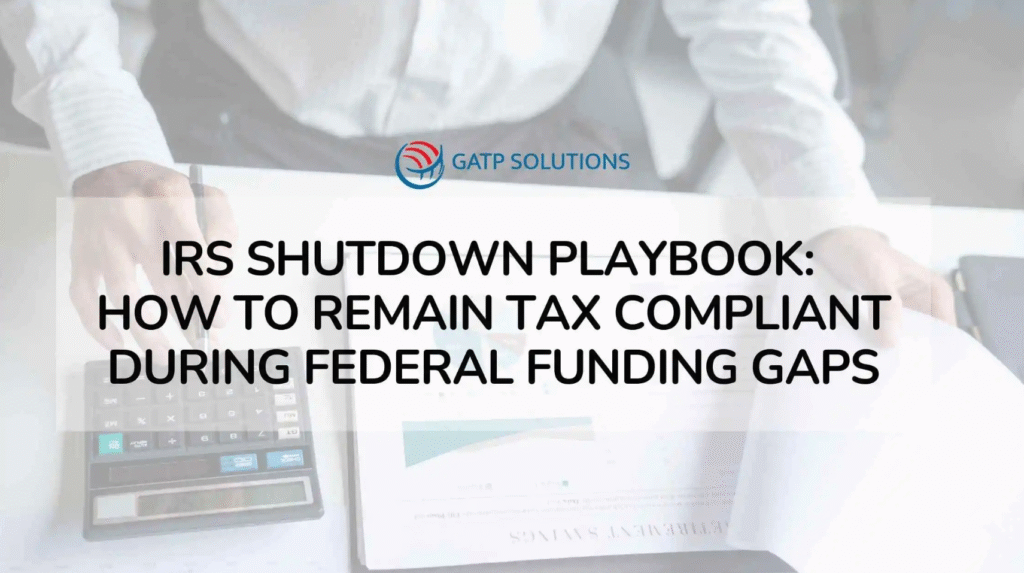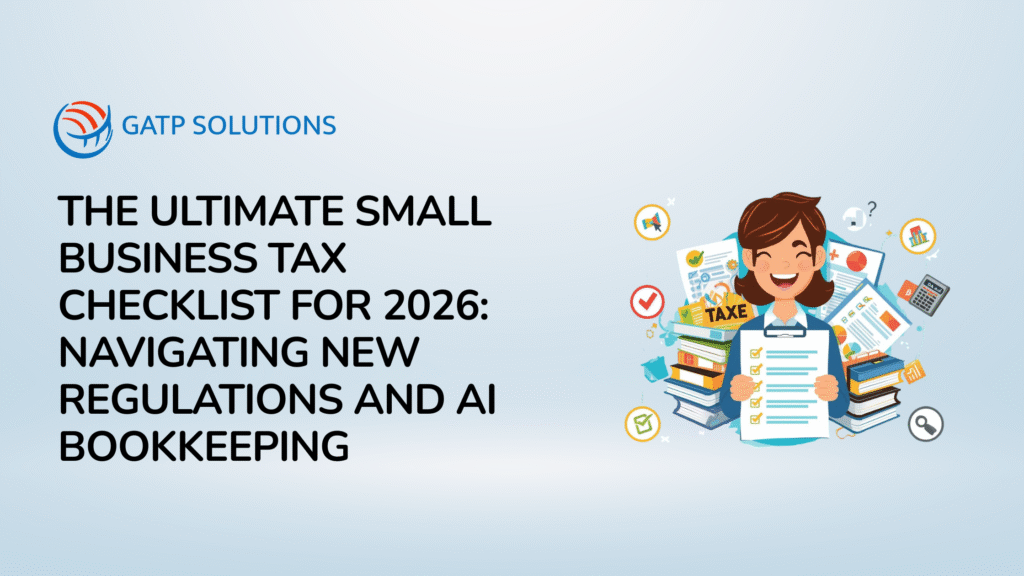The latest IRS Shutdown has left businesses, accountants, and taxpayers wondering: What Now?
As the taxpayer services are limited and thousands of IRS employees are temporarily suspended, the situation feels like everything has come to a halt for everyone. But still, one fact that we all need to remember is that tax compliance does not stop when the government does. The deadlines are still applicable, payments are still going through and the penalties can still be added on you.
For business owners, this switch means they have to adapt quickly and be updated with what is operational and what is not. However, this can be easily managed with the right plan in place.
Our latest IRS Shutdown Playbook explains what continues in this situation, what pauses, and how both businesses and individuals can stay in compliance during these federal funding gaps all while avoiding penalties, delays, and unnecessary stress.
What Happens to IRS Operations During a Shutdown?
The first thing most businesses and taxpayers want to know is what exactly changes during an IRS shutdown. While the agency continues some essential functions, many services are either suspended or delayed. Understanding what stays open and what pauses helps plan filings more effectively.
IRS Operations in 2025
In October 2025, the IRS initially stayed fully operational for five business days using Inflation Reduction Act funds. After October 8, nearly 35,000 employees were temporarily suspended, which left around 40,000 for important operations. This solidifies the agency’s message that the tax deadlines are still firm. Taxpayers will still get penalties and interest even though there is limited staffing. Hence, the tax law does not pause, and neither do the compliance requirements.
What are the Services That Continue During the Shutdown?
Despite the IRS shutdown, good news is that several core functions remain active. Businesses can still meet their obligations using the IRS’s digital infrastructure and automated systems like the following.
- Electronic filing and payment processing
- Automated refunds for error-free, electronically filed returns
- Access to IRS.gov and automated tools
- Payment acceptance for all obligations
- Ongoing enforcement and criminal investigations
Which Services Are Suspended or Delayed during the Shutdown?
While core systems remain functional, many human-assisted services are unavailable due to temporary suspension. Businesses will get limited access to live support and slower turnaround times for manual reviews. Following are the services that are suspended or delayed:
- Taxpayer Assistance Centers (TACs)
- Live phone support
- Paper return processing and amended return reviews
- Non-automated collections
- Taxpayer Advocate Service offices
What Can Businesses Learn from Previous IRS Shutdowns?
As the shutdowns have happened before, businesses can anticipate what may happen this time. The 2018-2019 shutdown was the longest in U.S. history which showcased major weaknesses in the system. The IRS had faced millions of blacklogged returns and delayed refunds that took almost a year to process.
Hence, we can say that even a short IRS shutdown can lead to long-term disruptions for businesses, accountants, and taxpayers.
Looking back at past shutdowns helps businesses anticipate what to expect this time. The 2018–2019 shutdown was the longest in U.S. history and exposed major weaknesses in the
GATP Solutions advises businesses to use shutdown periods to review tax compliance processes, strengthen documentation systems, and prepare for slower correspondence handling once IRS operations resume.
How Can Businesses Maintain Tax Compliance During an IRS Shutdown?
Businesses play a major role in keeping the system running smoothly, even when the government slows down. To stay compliant, businesses will need to follow deadlines, maintain proper records, and rely on automation whenever possible. Following are the ways in detail how as a business you can be tax compliant during the shutdown.
Maintaining Compliance with Tax Deadlines
All tax deadlines continue as scheduled, and the IRS has confirmed that penalties will still apply for missed filings.
Key business tax deadlines:
- October 15, 2025: Extended individual returns (Form 1040)
- November 17, 2025: Tax-exempt organization returns
- January 15, 2026: Fourth-quarter estimated payments
Penalties for late filing are 5% per month (up to 25%), while late payment penalties are 0.5% per month (up to 25%), plus interest.
GATP Solutions helps clients stay on track by managing filing schedules and automating tax compliance reminders through secure systems.
Why Electronic Filing Matters
Electronic filing is the safest and most reliable option during an IRS shutdown. It ensures returns are timestamped, payments are processed quickly, and confirmations are received instantly.
Why e-filing helps:
- Submissions are recorded instantly
- Reduces risk of lost mail
- Enables direct deposit refunds
- Continues processing even during staff shortages
Businesses can use EFTPS, IRS Direct Pay, or card payments for fast, verified processing.
GATP encourages clients to digitize their tax compliance systems to ensure seamless operations even during disruptions.
Managing Cash Flow During Federal Funding Gaps
Federal funding gaps can delay refunds and slow correspondence, creating short-term cash flow issues. You should proactively plan to stay liquid during these periods.
Cash flow management tips:
- Maintain reserves for at least two to three months of tax obligations
- Set up credit lines early to prevent liquidity issues
- Delay non-essential expenses until operations normalize
- Closely track receivables and adjust projections
Federal contractors should also prepare for project delays and review contracts for force majeure provisions.
Building a Business Continuity Plan
A strong business continuity plan (BCP) helps ensure operations do not stall during a shutdown. It focuses on maintaining access to critical records and meeting compliance deadlines.
Include in your BCP:
- Backup systems for accounting and tax data
- Updated compliance calendars and deadline logs
- Alternate contact channels for accountants and tax partners
- Contingency access to funds
GATP Solutions assists companies in building continuity frameworks and cloud-based tax systems to ensure uninterrupted tax compliance.
E-Verify and Employment Compliance
During the shutdown, E-Verify systems go offline, which affects hiring and verification processes. However, Form I-9 requirements remain in effect, and employers must document all verification efforts.
What to do:
- Continue collecting and verifying I-9 documentation
- Note E-Verify downtime for records
- Create cases as soon as systems reopen
Proper documentation demonstrates good-faith compliance once systems are back online.
The Role of Recordkeeping
Good recordkeeping can protect your business from penalties and disputes long after the shutdown ends. It ensures evidence of compliance even when communication with the IRS is limited.
Maintain copies of:
- All filed tax returns and payment proofs
- Certified mail receipts for paper filings
- Payroll, property, and bank records
- Communication logs and payment confirmations
GATP Solutions advises clients to maintain both digital and physical backups to safeguard tax compliance records.
How Can Individuals Stay Compliant During the IRS Shutdown?
For individual taxpayers, shutdowns can delay responses and refunds, but deadlines and payment obligations will still be applicable. Staying proactive is the best way to avoid penalties and stress later. The following are the ways individuals can remain tax compliant during the IRS shutdown:
Filing Extended Returns
The October 15 deadline applies even during the IRS shutdown. Filing electronically with direct deposit remains the best option for timely processing.
For U.S. expats, international filing and FBAR deadlines also remain unchanged.
Continuing Estimated Tax Payments
Quarterly payments must be made as scheduled to avoid penalties.
- September 15, 2025: Third quarter
- January 15, 2026: Fourth quarter
Taxpayers can also pay early or file by January 31 to settle all dues. Keep proof of payment for documentation.
Tracking Refunds
Refunds for electronically filed returns will continue, though paper and amended returns face delays. Taxpayers should expect longer timelines and use online tools to track their status.
How to monitor refunds:
- Use the “Where’s My Refund” tool on irs.gov
- Access the IRS2Go app
- Review online IRS account transcripts
Responding to IRS Notices
Automated systems still issue notices during the IRS shutdown, even though resolution options may be limited. Responding promptly and documenting actions helps prevent complications later.
GATP Solutions assists clients in reviewing notices, preparing written responses, and maintaining accurate compliance records.
Getting Professional Help
During a shutdown, most IRS support lines and offices are closed. However, IRS.gov tools and qualified tax professionals remain available for guidance.
GATP Solutions helps individuals file electronically, monitor refund updates, and address compliance questions until services return to normal.
Why Are Tax Professionals Essential During an IRS Shutdown?
Dealing with the IRS Shutdown on your own can be complicated and messy without any expert help and knowledge. Tax professionals provide you with experience, structure, and the clarity to keep compliance on track when the IRS systems are limited.
GATP Solutions offers managed tax services, ensuring clients meet every deadline, maintain documentation, and minimize penalty risks.
How Can Businesses Stay Updated During the IRS Shutdown?
Information changes quickly during a federal funding gap. Businesses must rely on official channels for accurate updates while maintaining transparent communication with stakeholders.
Recommended sources:
- IRS.gov newsroom
- IRS e-News for Tax Pros
- Treasury Department updates
- Professional bodies like AICPA and NAEA
What Should Businesses Expect After the IRS Shutdown Ends?
Once operations resume, the IRS faces massive processing backlogs. Businesses should prepare for delays in refund issuance and correspondence resolution.
To stay proactive:
- Follow up early on pending issues
- Monitor account transcripts for updates
- Prepare 2026 filings ahead of schedule
GATP Solutions helps businesses manage post-shutdown transitions, track filings, and maintain organized tax compliance systems.
Do State Taxes Get Affected by the IRS Shutdown?
State tax departments are not impacted by the IRS shutdown. State deadlines, refunds, and compliance obligations continue as usual. Businesses should continue their state-level filings without interruption.
Can Technology Help Manage Tax Compliance During a Shutdown?
Technology can make a major difference in maintaining compliance during a federal funding gap. Automation reduces manual work and ensures no deadline is missed.
Automation advantages:
- Tracks filings and payments automatically
- Stores records securely in the cloud
- Integrates with electronic filing systems
- Generates detailed compliance reports
GATP Solutions helps businesses implement automation tools to simplify compliance and reduce disruption risk.
Are There Any Legal or Penalty Exceptions During an IRS Shutdown?
The IRS has clarified that shutdowns do not trigger automatic extensions. Filing and payment obligations remain active, and penalties continue to apply.
In limited cases, taxpayers can seek penalty abatement if they can prove reasonable cause and document their compliance efforts.
Key Takeaways
For Businesses
- Continue all filings and payments electronically.
- Maintain strong tax compliance records and documentation.
- Manage cash flow carefully during federal funding gaps.
- Build and test a business continuity plan.
- Use automation tools for tracking and compliance.
- Communicate proactively with employees and vendors.
- Partner with experts like GATP Solutions for real-time guidance.
For Individuals
- File extended returns electronically before deadlines.
- Keep proof of estimated tax payments.
- Track refunds through IRS online tools.
- Respond promptly to IRS notices.
- Maintain digital and physical documentation.
- Work with tax professionals for clarity during service disruptions.
At GATP Solutions, our team supports businesses and individuals through every phase of an IRS shutdown. From managing electronic filings to building continuity systems and ensuring accurate compliance, we help clients stay prepared and penalty-free.
Federal funding gaps may slow the system, but with the right approach, businesses can stay compliant and confident.
Frequently Asked Questions
- What exactly happens during an IRS shutdown?
During an IRS shutdown, many IRS employees are furloughed, and most in-person and phone services are suspended. However, tax compliance obligations remain fully active. Businesses and individuals must still file returns, make payments, and meet all deadlines as usual.
- Are tax deadlines postponed because of the IRS shutdown?
No. The IRS shutdown does not delay or cancel any deadlines. All filing and payment schedules stay in effect, and penalties continue to apply for late submissions or missed payments.
- Can businesses still file taxes during a shutdown?
Yes, businesses can still file electronically. Electronic filing systems and payment platforms like EFTPS and IRS Direct Pay remain operational throughout the federal funding gap, even when paper return processing is delayed.
- What should businesses prioritize during an IRS shutdown?
Businesses should focus on:
- Filing all returns on time
- Paying taxes electronically
- Maintaining strong recordkeeping practices
- Managing cash flow for delayed refunds
- Documenting every compliance effort
GATP Solutions helps businesses streamline these tasks with automated filing and compliance systems.
- Will the tax refunds be delayed?
Refunds for electronically filed returns are still processed, though slower than usual. Paper and amended returns face significant delays until the IRS resumes full staffing. Tracking refunds through IRS.gov or the IRS2Go app is the best option during a shutdown.
- How does the IRS shutdown affect small businesses?
Small businesses often feel the impact most, especially if they rely on quick refunds or need to contact the IRS for guidance. During the IRS shutdown, live support is unavailable, making it essential to work with tax professionals like GATP Solutions to stay compliant and minimize disruptions.
- Do individuals still need to pay estimated taxes during the shutdown?
Yes. Quarterly estimated tax payments must be made on time, even during the shutdown. The IRS continues to process electronic payments, and failure to pay may lead to penalties and interest charges.
- What happens to audits and notices during a shutdown?
Automated systems continue sending out IRS notices and audit letters, but there are usually no staff available to handle responses. Taxpayers should keep records, document notice dates, and contact their tax advisor as soon as normal operations resume.
- How can GATP Solutions help during an IRS shutdown?
GATP Solutions helps businesses and individuals:
- File returns electronically and accurately
- Manage tax compliance deadlines
- Maintain documentation for penalty protection
- Plan for cash flow during refund delays
- Stay informed about IRS operational updates
Our team ensures clients stay compliant even when the system slows down.
- Will there be penalties if I can’t reach the IRS during the shutdown?
Yes, penalties can still apply. The IRS considers filing and payment deadlines legally binding, regardless of operational slowdowns. Keep your proof ready, like e-filing confirmations, digital receipts, and documented attempts to pay.




